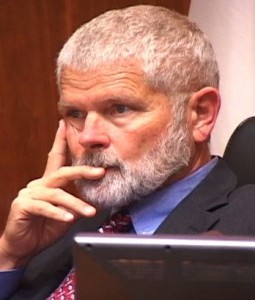Paso Robles property owners win water rights battle
September 3, 2015

Supervisor Bruce Gibson is an advocate for lessening the public’s water rights.
By KAREN VELIE
A group of Paso Robles property owners won a major court battle in their war against several water purveyors who contend they have notoriously taken water from the Paso Robles Basin for at least five years and now have greater rights to the water than the property owners.
In response to the San Luis Obispo County Board of Supervisors enacting an urgency ordinance that limits water use over the basin, more than 200 property owners, called Protect our Water Rights, filed for quiet title. The plaintiffs allege the ordinance limits water usage “regardless of the priority of their California overlying property rights,” according to a ruling by San Clara County Superior Court Judge Peter Kirwan.
California state law provides overlying property owners the right to pump underground water for reasonable and beneficial uses. Those purveyors selling water have lesser rights to the water during an overdraft.
However, if the water purveyors – San Luis Obispo County, City of Paso Robles, San Miguel Community Services district, Atascadero Mutual Water Company and the Templeton Community Services District – can prove that the basin was in overdraft for the past five years and that they then openly and notoriously took water from the basin, they may get prescriptive rights. Prescriptive rights would provide those agencies a greater right to pump water from the basin than the property owners.
According to Kirwan’s ruling, the property owners requesting quiet title only need to prove they have title to the property and that it lies over the basin. The burden then shifts to the agencies claiming prescriptive rights to show the validity of their claim.
“An appropriative taking of water which is not surplus is wrongful and may ripen into a prescriptive right where the use is actual, open and notorious, hostile and adverse to the original owner, continuous and uninterrupted for the statutory period of five years and under claim of right,” the ruling says.
In a May 31, 2010 email from then SLO County Director of Public Works Paavo Ogren to SLO County Supervisor Bruce Gibson, Ogren explains prescriptive rights and notes that the Paso Robles basin is not in overdraft.
“Our current studies do not indicate that the Paso basin is in overdraft,” Ogren writes. “Even issues of well interference do not provide direct evidence of overdraft, and damages do not exist just because someone has to drill deeper to get water because others have installed wells to satisfy their overlying uses.”
On, Aug. 28, Kerwan ruled that none of the water purveyors have sufficiently proven that they have prescriptive rights. He gave each of the purveyors 10 days to amend their defense.
“Judge Kirwan affirmed the law,” said Cindy Steinbeck, spokesperson for Protect our Water Rights. “The law is clear, purveyors such as the county and cities only have a right to extract surplus water from the basin. To gain a prescriptive right, the defendants must openly and notoriously, illegally continue pumping for a period for five years during a time of overdraft. There has never been an official claim or finding of an overdraft condition in the Paso Robles Groundwater Basin. Without that, there can be no prescription.”
Get links to local news stories, like CCN on Facebook.






The comments below represent the opinion of the writer and do not represent the views or policies of CalCoastNews.com. Please address the Policies, events and arguments, not the person. Constructive debate is good; mockery, taunting, and name calling is not. Comment Guidelines